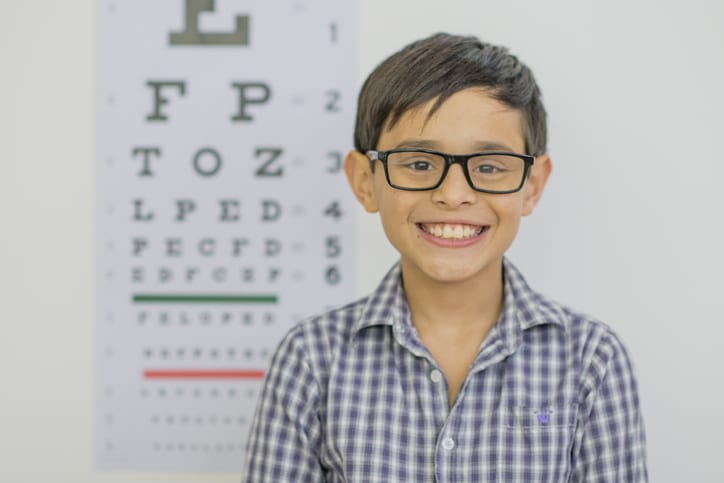
Comprehensive Eye Exam at Central Florida Eye Institute
No one wants to even think about life without good vision. So it’s surprising how many people worry more about when to change the oil in their car than when to have their eyes examined. Your eyes are miracles of refractive power, but like most organs in your body, they need some preventive attention in the form of a regular eye exam. This isn’t being obsessive or overly cautious — many eye conditions don’t exhibit symptoms until they are already damaging your vision. And who wants that?
Here’s what is involved in an eye exam at Central Florida Eye Institute in Ocala, FL.
Schedule an Eye Exam Today – 352-237-8400
What Is Tested in a Comprehensive Eye Exam?
Eye exams are so much more than simply telling a person they have 20/20 or 20/100 vision. We take these exams very seriously and continually upgrade to the latest technology. They allow us to check your refraction quality and detect early signs of eye disease.
Here are the tests and assessments we’ll conduct during an eye exam:
- Refraction Assessment: When light enters your eyes, it’s bent (or refracted) as it travels to the retina at the back of your eye. If the light doesn’t focus correctly, it’s called a refractive error, which leads to vision issues like farsightedness. Glasses or contact lenses help fix these errors. To determine the best prescription, the doctor uses a device called a phoropter, which rotates different lenses in front of your eyes to see which ones give you the clearest vision.
- Visual Acuity Test: This old standby test uses an alphabet eye chart called the Snellen chart. We have you cover one eye and read the letters that get progressively smaller the farther down you read.
- Vision Field Test: This determines if you have difficulty seeing in any areas of your overall field of vision. We use an automated perimetry machine where you look at a screen with blinking lights. You press a button each time you see a blink.
- Eye Muscle Test: You simply follow an object, and we watch your eye movements to check for muscle weakness, poor control, or poor coordination between eyes.
- Color Vision Test: To test for color vision problems, we show you several multicolored dot-pattern tests during the eye exam. There are numbers and shapes within the dot patterns. If you have some colorblindness, you won’t see the numbers/shapes in the dots.
- Slit-Lamp Examination: The slit lamp is a microscope that illuminates and magnifies the front of your eye. We examine your eyelids, lashes, cornea, iris, lens, and the fluid chamber in your eye.
- Retinal Examination: Sometimes called funduscopy or ophthalmoscopy, this is the examination of the back of your eye, where the retina, optic disc, and various blood vessels are found. For this eye exam, we usually dilate your eye with eye drops. These keep the pupil from getting smaller when we shine a light on it.
- Glaucoma Screening: Glaucoma is a disease that can cause elevated pressure, damage to the optic nerve, and even loss of peripheral vision. We check the pressure inside your eye during each eye exam.
How Often Should You Have an Eye Exam?
The American Optometric Association (AOA) suggests that people should follow this general timeline for eye exams:
For adults:
- Ages 18-39: At least every two years for those who are asymptomatic and at low risk. Those at higher risk should have annual exams or as recommended by their optometrist.
- Ages 40-64: At least every two years for low-risk individuals. Annual exams are recommended for those at higher risk.
- Ages 65 and older: Annual exams for everyone, regardless of risk level.
For children:
- Birth to 2 years: First exam between 6 to 12 months.
- Ages 3-5: At least one exam between ages 3 and 5.
- Ages 6-17: Before first grade and annually thereafter.
Contact Us Today For More Information
How Often Should My Child Have an Eye Exam?
Vision is a critical component of learning, which is why it’s so important for children to have their eyes checked to see where their vision stands. Plus, an eye exam can catch childhood vision diseases and conditions before they cause permanent vision damage. The AOA estimates that 20% of preschoolers and 25% of school-aged children have vision problems.
The AOA recommends infants should have their first comprehensive eye exam at six months. Beyond that, the next eye exam should be at age three and again right before the child enters kindergarten or first grade, around age five or six.
My Eyes Seem Fine. Why Do I Need to Get an Eye Exam?
Just as you shouldn’t wait until a tooth has shooting pain to go to the dentist or wait for that suspicious spot on your skin to turn into melanoma before seeing a dermatologist, you shouldn’t wait to have your eye exam until you start having problems with your sight. If you wait too long, you can permanently lose some of your vision.
Glaucoma, where pressure builds inside the eye and damages the optic nerve, usually shows no symptoms until damage has been done. The same is true for macular degeneration – one day, you may notice you can’t see as well in the center of your field of vision, which means degradation has begun.
When it comes to protecting your eye health, prevention is key. Hopefully, when you come to see Dr. Croley, you will breeze through our series of tests, and all will be well. But each eye test, such as testing intraocular pressure for glaucoma, has a purpose. Even if you only need refractive adjustment, such as changing your eyeglasses or contact lens prescription, you’ll see more clearly and effectively. Plus, you’ll have the peace of mind knowing that there’s nothing more dangerous happening behind the scenes with your eyesight.
Call Today to Schedule an Eye Exam – 352-237-8400
Why Choose Central Florida Eye Institute?
At Central Florida Eye Institute, you’ll receive advanced eye care from Dr. Thomas L. Croley, a board-certified ophthalmologist with expertise in cataract surgery, LASIK, PRK, and intraocular lens implantation. His continuous commitment to specialized training ensures that patients receive state-of-the-art treatments. He regularly shares his knowledge with other specialists and provides free educational seminars to help the community stay informed about eye health.
Dr. Croley is affiliated with the American Academy of Ophthalmology and the American Medical Association. His dedication to his patients has positioned Central Florida Eye Institute as one of Florida’s premier eye care facilities. Dr. Croley is ready to address any of your vision needs.
Patient Testimonials
“I just wanted to thank Julia in the optical department for taking the time with me to help me pick out the best frames for my extremely high eyeglass prescription. She went above and beyond to make me feel comfortable in what frames would look best and to help me feel less self conscious. I’m so glad that there are still people out there who love their jobs and really make an effort to help customers. Thank you again and I will definitely be going to Central Florida Eye institute for my next eye exam!” – Jamie F.
“Every staff member I’ve had the pleasure of meeting, has been extremely welcoming, informative, and kind. Staff is attentive and genuinely seem happy to work here.” – Kellie McGee
Read More Patient Testimonials
Frequently Asked Questions About Eye Exams
Does an Eye Exam Hurt?
Eye exams are generally not painful. You may experience very minimal discomfort from these tests:
- Puff of Air Test: This test measures the pressure inside your eyes to check for glaucoma. You might feel a gentle puff of air on your eye, which can be startling.
- Eye Dilation: We use dilating drops to widen your pupils so the doctor can get a better view of the retina. The drops may cause a slight stinging or burning sensation that goes away quickly.
- Bright Lights: The doctor may shine a bright light into your eyes to examine them, which can feel uncomfortable but not painful.
- Contact Lens Test: If needed, the doctor may touch your eye lightly to measure eye pressure or to check for contact lenses. They’ll often use numbing drops to minimize discomfort.
How Long Does an Eye Exam Take?
A complete eye exam takes about 45 minutes to an hour.
Am I Allowed to Drive After My Eye Exam?
Yes, you can drive yourself home. If you’ve had your eyes dilated, which is sometimes necessary to check the retina in the back of the eye, your eyes will be more sensitive to light. Sunglasses provide adequate protection until they return to normal.
Does Insurance Cover My Eye Exam?
Most insurance covers the medical portion of your eye exam only. The refraction is a “non-covered” service, which means you usually have to pay for that portion of the exam. However, insurance plans and coverages vary widely, so it’s best to contact your carrier and find out. We work with your insurance company to facilitate coverage.
Questions? Fill Out Our Online Contact Form
Schedule Your Eye Exam Today!
For more information or to schedule an eye exam at our practice in Ocala, FL, give us a call at (352) 237-8400 or visit our Contact Us page to request a consultation today! We proudly serve patients in Ocala, Gainesville, Lady Lake, Leesburg, and Inverness, FL and surrounding areas.

